MercoPress. South Atlantic News Agency
Fisheries
-
Tuesday, January 6th 2015 - 06:30 UTC
Falklands' dispute: claims Japanese company fished in Argentine and Islands waters

The Argentine ministries of Foreign Affairs, and Agriculture and Fisheries are considering the consequences of a complaint filed in recent days by a top official from a local company (Empresa Pesquera de la Patagonia y Antártica S.A., Pesantar) warning that the vessel “Union Sur” had fished in Falkland Islands last November.
-
Monday, December 22nd 2014 - 20:45 UTC
Argentina: Jigger owners request to start squid season earlier
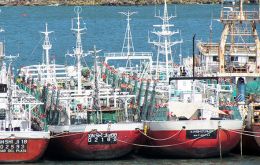
The Chamber of Jigger Owners from Argentina (CAPA) has requested the Federal Fisheries Council (CFP) the anticipated start of the squid (Illex argentinus) season in 2015.
-
Thursday, December 18th 2014 - 02:34 UTC
South Atlantic: “Fewer catches as illex squid season ends”

The Argentine jigging fleet captured nearly 150,000 tonnes of squid (Illex argentinus) in South Atlantic waters during the season that took place between 24 January and 31 August this year, according to a technical report issued by the National Institute for Fishing Research and Development (INIDEP).
-
Saturday, December 13th 2014 - 04:07 UTC
Argentina purchases four Russian multipurpose polar Supply-class tugs
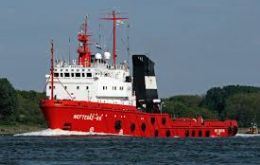
Argentina's ministry of Defense has signed an agreement for the purchase of four Russian-built multipurpose polar tugs, class NEFTEGAZ, at a total cost of just over eight million dollars.
-
Saturday, December 13th 2014 - 03:53 UTC
Gibraltarians support allowing regulated commercial fishing in territorial waters

An overwhelming majority of Gibraltarians believe that Gibraltar should take part in ‘ad hoc’ talks with Spain and the UK and there is strong support for allowing commercial fishing in British Gibraltar territorial Water so long as this is under a properly regulated licensing system.
-
Friday, December 12th 2014 - 06:54 UTC
Record year for Falklands' fish catches
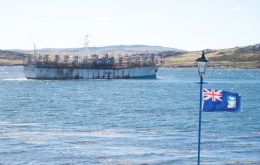
THIS year will be marked as one of the most successful years in the history of the Falkland Islands fishery with several record catches registered and the total catch of all species in Falkland waters this month reaching a record of 451,000 tonnes.
-
Thursday, December 4th 2014 - 06:06 UTC
Ecuador to combat IUU fishing as part of trade agreement with the EU

Ecuador's Deputy Minister of Aquaculture and Fisheries organized a workshop with representatives from various government institutions related to port and maritime fisheries control in the country in order to develop a National Action Plan to prevent, deter and eliminate illegal, unreported and unregulated (IUU) fishing.
-
Wednesday, November 19th 2014 - 09:49 UTC
Great future for aquaculture forecasts FAO; record output of 66.5m tons in 2012

Fish farming will likely grow more than expected in the coming decade, offering a chance for improved nutrition for millions of people, especially in Asia and Africa, according to a new report, from FAO.
-
Wednesday, November 19th 2014 - 07:51 UTC
Greenpeace condemns Japan’s rush to resume Antarctic whaling
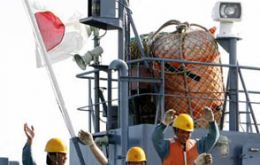
Greenpeace on Tuesday condemned the Government of Japan's rush to resume Antarctic whaling and called on them to abide by world opinion and the clearly expressed desires of the International Whaling Commission (IWC).
-
Thursday, November 6th 2014 - 08:12 UTC
Greenpeace names twenty “monster vessels, the scourge of the oceans”
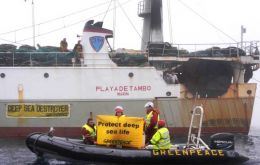
Five fishing vessels from Spain are among the 20 most destructive community fishing vessels in the European Union, according to a new report from the environmental organization Greenpeace. Out of the five, two are from Galicia,: Eirado do Costal, with home port in Cangas, and Playa de Tambo, based in Marin.
